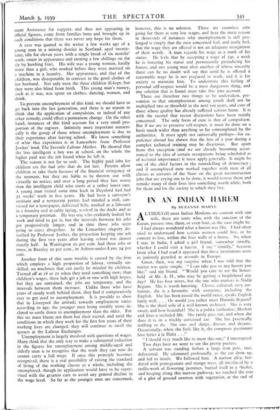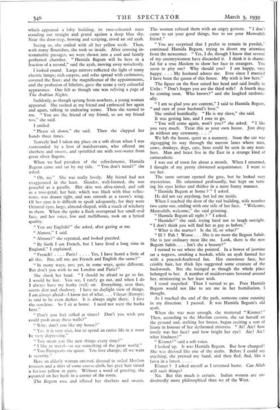IN AN INDIAN HAREM
By SUZANNE MARIE
ALTHOUGH most Indian Moslems are content with one wife, there are some who, with the sanction of the Koran, possess two, three, or even four, as the case might be.
I had always wondered what a harem was like. I had often tried to understand how certain women could live, or be content to live, within the four walls of a house. So, when I was in India, I asked a girl friend, somewhat timidly, whether I could visit a harem. I say " timidly," because from what I had read it appeared that these institutions were as jealously guarded as arsenals in Europe.
Great, then, was my surprise when I was told that the matter was quite simple. " I can take you to any harem you like," said my friend. " Would you care to see the house- hold of Mr. A. H., who may be getting a knighthood any day? He has four wives, but the one who matters is Nadja Begum. She is worth knowing. Clever, cultured, very am- bitious, she is a favourite with everyone, including the English. She has been round the world twice, speaks English fairly well. . . . Or would you rather meet Hamida Begum? She is the third wife of a well-known architect. She is very sweet, and how beautiful! She is a pukka (orthodox) Moslem and lives a secluded life. She rarely goes out, and when she does it is in a thickly curtained car. She has practically nothing to do. She eats and sleeps, dresses and dreams. Occasionally, when she feels like it, she composes passionate love lyrics a la Hafiz ."
" I should very much like to meet this one," I interrupted. Two days later we went to see the pretty poetess.
A servant was standing before a large iron gate, taut, deferential. He salammed profoundly, as the car drew up, and led us inside. We followed him. A narrow alley, bor- dered with pomegranate and mango trees, all interlaced by a trellis-work of flowering jasmines, buried itself in a thicket, and keeping along this narrow pathway, we reached the rear of a plot of ground overrun with vegetation, at the end of which appeared a lofty building, its rose-coloured mass standing out straight and grand against a deep blue sky. Near the door-step, bowing and scraping, stood an old ayah.
Seeing us, she smiled with all her yellow teeth. Then, with many flourishes, she took us inside. After crossing in- terminable passages, we were shown into a cool and faintly perfumed chamber. "Hamida Begum will be here in a fraction of a second," said the ayah, moving away noiselessly.
I looked round. Large mirrors reflected the light of many electric lamps; rich carpets, and sofas spread with cashmeres, covered the floor; and the magnificence of the appointments, and the profusion of bibelots, gave the scene a very colourful appearance. One felt as though one was reliving a page of The Arabian Nights.
Suddenly, as though sprung from nowhere, a young woman appeared. She rushed at my friend and embraced her again and again, talking in endearing terms. Then she turned to me. " You are the friend of my friend, so are my friend too," she said.
I smiled.
" Please sit down," she said. Then she clapped her hands three times.
Scarcely had I taken my place on a soft divan when I was surrounded by a host of maidservants, who offered me sherbets and sweets, and sprinkled me with rose-water from great silver flagons.
When we had partaken of the refreshments, Hamida Begum came and sat by my side. " You don't mind?" she asked.
" Oh, no." She was really lovely. My friend had not exaggerated in the least. Slender, well-formed, she was graceful as a gazelle. Her skin was olive-tinted, and soft as a rose-petal; her hair, which was black with blue reflec- tions, was drawn tight, and was smooth as a raven's wing. Of her eyes it is difficult to speak adequately, for they were Oriental eyes, large, almond-shaped, with a touch of witchery in them. When she spoke a flush overspread her small oval face, and her voice, low and mellifluous, took on a lyrical quality.
" You are English?" she asked, after gazing at me.
" Almost," I said.
" Almost?" she repeated, and looked puzzled.
" By birth I am French, but I have lived a long time in England," I explained.
" French! . . . . Paris! Yes, I have heard a little of all this. But, tell me, are French and English the same?"
" In many ways, yes; yet, in some ways, quite different. But don't you wish to see London and Paris?"
She shook her head. " I should be afraid to go so far. I would be lost. You see, I rarely go out, and when I do I always have my burka (veil) on. Everything, seen thus, seems dim and shadowy. I have no daylight view of things. I am always afraid—I know not of what.... Vilayat (Europe) is said to be even darker. It is always night there. I love the sunshine. So I sit at home. I need not wear the burka here."
" Don't you feel stifled at times? Don't you wish you could push away these walls?"
" W hy, don't you like my house?"
" Yes, it is very nice, but to spend an entire life in it must be very depressing."
" You mean you like new things every time?"
" I like to travel—to see something of the great world." " You Europeans arc queer. You love change; all we want is security."
Here an elderly woman entered, dressed in soiled Moslem trousers and a shirt of some coarse cloth, her grey hair tinted a furious yellow in parts. Without a word of greeting, she tsquatted on her heels in a corner of the room.
The Begum rose and offered her sherbets and sweets. The woman refused them with an angry gesture. " I don't come to eat your good things, but to see your Memsahib friend."
" You are surprised that I prefer to remain in purdah,- continued Hamida Begum, trying to divert my attention from the newcomer. " Yes, I do, though I know that several of my countrywomen have discarded it. I think it is shame- ful for a true Moslem to show her face to strangers. You seem to pity me? Why should you? I am happy, very happy. . . . My husband adores me. Ever since I married I have been the queen of this house. My wish is law here."
The figure on the floor raised her head and said loudly in Urdu: " Don't forget you are the third wife! A fourth may be coming soon. Who knows?" and she laughed sardonic- ally.
" I am so glad you are content," I said to Hamida Begum. " and sure of your husband's love."
She smiled beatifically. " He is my slave," she said. It was getting late, and I rose to go.
" You will come again, won't you?" she asked. " I like you very much. Treat this as your own house. Just drop in without any ceremony. . . ."
We left the house, quiet as a nunnery. Soon the car was zigzagging its way through the narrow lanes where men, cows, donkeys, dogs, cats, hens could be seen in any num- bers. Man and beast live in the East in a strange kind of camaraderie.
I was out of town for about a month. When I returned. I thought of my pretty cloistered acquaintance. I went to see her.
The same servant opened the gate, but he looked very mysterious. He salamrned profoundly, but kept on turn- ing his eyes hither and thither in a most funny manner.
" Hamida Begum at home ? " I asked.
He did not say anything, but led me inside.
When I reached the door of the red building, wife number two came out, smiling with one side of her face. " Welcome, Memsahib, welcome," she said grinning.
" Hamida Begum all right ? " I asked.
"Hamida?" she said, trying hard not to laugh outright. " I don't think you will find her as gay as before."
" What is the matter? Is she ill, or what?"
" Ill ? Pah ! Worse .. . She is no more the Begum Sahib. She is just ordinary meat like me. Look, there is the new Begum Sahib. . . . Isn't she a beauty?"
I turned to see where she pointed. In a bower of jasmine sat a negress, smoking a hookah, while an ayah fanned her with a peacock-feathered fan. Her enormous face, her crinkly hair, her thick lips suggested some creature of the backwoods. But she lounged as though the whole place belonged to her. A number of maidservants hovered around her, ministering to her least wish.
I stood stupefied. Then I turned to go. Poor Hamida Begum would not like to see me in her humiliation, I thought.
As 1 reached the end of the path, someone came running in my direction. I paused. It was Hamida Begum's old ayah.
When she was near enough, she muttered " Kismet!" Then, according to the Muslim custom, she sat herself on the ground and, striking her breast, began reciting a sort of litany in honour of her dethroned mistress. " Ai! Aie! how lovely was her face! and how bright her eye! Aie! Aie! what kindness!"
" Kismet!" said a soft voice.
I looked up. It was Hamida Begum. But how changed! She was dressed like one of the ayahs. Before I could say anything, she pressed my hand, and then fled, fled, like a fawn in a forest Kismet ? I asked myself as I returned home. Can Allah will such things?
No. But this much is certain. Indian women are un- doubtedly more philosophical than we of the West.



























































 Previous page
Previous page